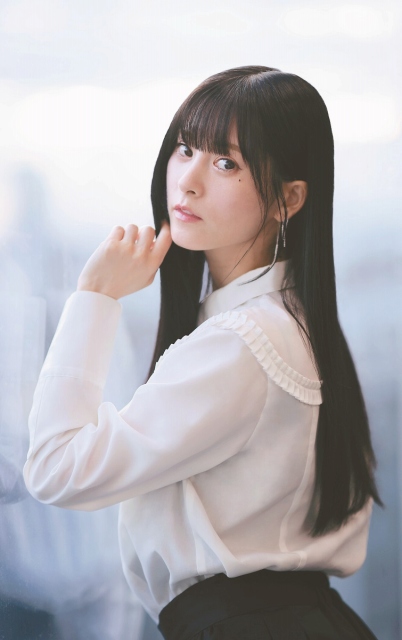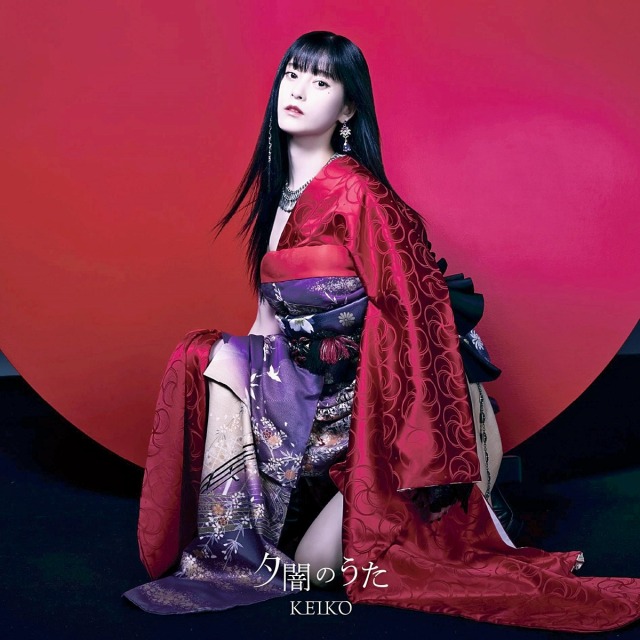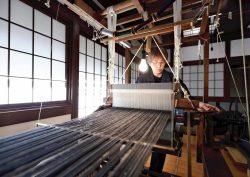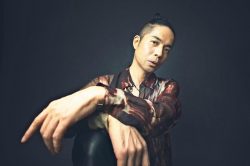
Keiko
12:00 JST, March 22, 2024
“Yuyami no Uta” (The song of twilight), a new song by Keiko recently released by the Avex label, may become a hallmark song for the former Kalafina vocal trio member who has been building a successful solo career.
The song plays during the ending credits for the TV anime “Sengoku Youko: Yonaoshi Kyodaihen” (“Sengoku Youko: The Reformer Siblings Arc”), which is shown on Tokyo MX and other channels. This is Keiko’s first tie-in project with a TV anime after going solo. Yuki Kajiura, Kalafina’s producer, wrote the lyrics for the song, which she also composed and arranged.

“Sengoku Youko: Yonaoshi Kyodaihen” (“Sengoku Youko: The Reformer Siblings Arc”)
The anime is based on the manga “Sengoku Youko” by Satoshi Mizukami. The story follows a fox monster named Tama, who likes humans, and her stepbrother Jinka, who hates them. It is a fantasy adventure where the heroes fight back the darkness to defeat a great evil that has infected society in turbulent, warring times. “Yuyami no Uta” has an alluring, Japanesque melody that suits the story and features Keiko’s powerful singing that gradually rises in intensity.
Kajiura, who created the song, is regarded as a legend in the world of animated films and TV shows. Songs she has written include those by Kalafina and “Homura,” the theme song of “Kimetsu no Yaiba: Mugen Ressha-hen” (“Demon Slayer: Kimetsu no Yaiba – The Movie: Mugen Train”) sung by LiSA.
“Working on anime and with Ms. Kajiura feels right at home,” Keiko said.
During recording sessions, Keiko had thorough discussions with Kajiura on how to articulate the words and how to sing the melody.
“First, of all, I started by singing how I thought would work. Then, [Kajiura] carefully gave me directions for expressing the song,” Keiko said, adding that the song is elaborately structured from vocalization to the tone of each note.
At the song’s climax, there is a long, melismatic strain that soars high. Songs by Kajiura often have idiosyncratic melody lines and coined words, which her fans call “Kajiura language.”
This culminating melody, the highlight of “Yuyami no Uta,” has no lyrics. It’s like the heightened emotion leaves words behind and rises into the sky on its own, and that moment represents a milestone for Keiko’s singing, according to Keiko.
Did Kajiura give Keiko directions on how to sing this melody? According to the singer, Kajiura told her, “If Keiko can sing without hesitation and feels good about it, then that’s how it should be.”
“Really, that’s all that matters about this part,” Keiko said.
Kajiura laid out a critical “blank” spot in the song for Keiko, who responded to Kajiura’s intention wholeheartedly. It demonstrates the great relationship between two artists aiming for lofty expression.
Yutaka Ozaki effect
Keiko became interested in singing because of her admiration for singers such as Namie Amuro and Britney Spears, as well as the pop group Speed.
“I wanted to be an artist who can sing and dance, so I entered a specialist school when I was in the second year of junior high school. It was the first time that I had really decided to do something like that on my own. Taking lessons with others made me aware of just how competitive I am,” Keiko said.
The real turning point came when she was in the third year of junior high school. A male student asked her to sing to accompany his piano playing, and she happened across songs like “I Love You” by the late Yutaka Ozaki.
“I like things with a polished beauty. But it seemed to me that Ozaki was trying to say that true beauty is found in places where such things have been removed and destroyed. His emotional songs were so impactful that I started wanting to learn more about singing. So I started taking more serious lessons with a vocal coach,” she said.

While Keiko was improving her singing ability and gaining experience as an amateur singer, she met Kajiura and joined Kalafina, which later became known for their imaginative and fantastic, intriguing songs and amazing singing. The group formed with Kajiura as the producer and burst into the spotlight in 2008 with their debut song, “oblivious,” which was created for the animated film “Gekijoban: Kara no Kyokai” (The garden of sinners).
“I’ve learned many things from Ms. Kajiura,” Keiko said. “She told me, ‘If you don’t have vocal skills, you may not be able to find your way to the stage you really want to sing at. That would be such a disappointment. Being passionate about singing is vital, but don’t forget to polish your skills, too.’ Her words still echo in my heart.”
Keiko sang the lowest notes in the trio, requiring a deep voice. Kalafina released well-known songs, including the opening theme of NHK’s history program “Rekishi Hiwa Historia” and many songs used in anime. The group successfully performed at big venues nationwide like the Nippon Budokan Hall in Tokyo and also toured abroad.
The trio disbanded in 2019 and their fans still miss them. Keiko began her solo activities the following year. She has worked with many creative artists and sung in various genres, such as rock and electro-pop music. She sometimes writes lyrics and music for songs as well.
“There are still so many things I haven’t done yet. I’d like to be someone who takes on tons of challenges,” Keiko said.
Following the success of “Yuyami no Uta,” it seems like her glamor is going to shine all the brighter.
KEIKO
Born on Dec. 5, 1985, the Tokyo native has been active as a singer since 2008, when she debuted as a member of the vocal trio Kalafina, produced by Yuki Kajiura. After the trio disbanded in 2019, Keiko went solo in the spring of 2020, building a busy career.
Top Articles in Culture
-

BTS to Hold Comeback Concert in Seoul on March 21; Popular Boy Band Releases New Album to Signal Return
-

Director Naomi Kawase’s New Film Explores Heart Transplants in Japan, Production Involved Real Patients, Families
-

‘Jujutsu Kaisen’ Voice Actor Junya Enoki Discusses Rapid Action Scenes in Season 3, Airing Now
-

Tokyo Exhibition Offers Inside Look at Impressionism; 70 of 100 Works on ‘Interiors’ by Monet, Others on Loan from Paris
-

Traditional Japanese Silk Hakama Tradition Preserved by Sole Weaver in Sendai
JN ACCESS RANKING
-

Producer Behind Pop Group XG Arrested for Cocaine Possession
-

Japan PM Takaichi’s Cabinet Resigns en Masse
-

Japan Institute to Use Domestic Commercial Optical Lattice Clock to Set Japan Standard Time
-

Man Infected with Measles Reportedly Dined at Restaurant in Tokyo Station
-

Israeli Ambassador to Japan Speaks about Japan’s Role in the Reconstruction of Gaza
























